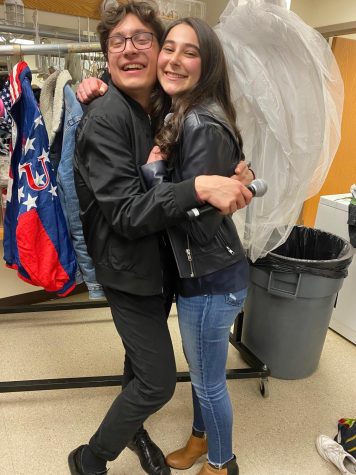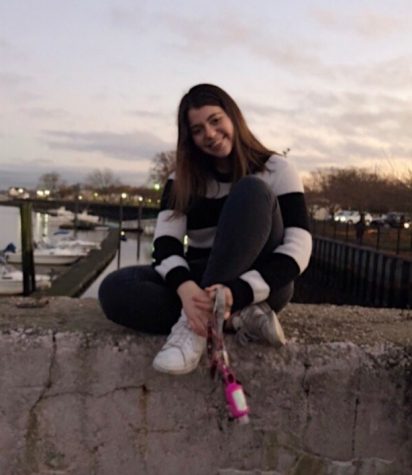Q&A with SHS Directors Grant Schechtman and Annie Radin
February 1, 2020
Can you give me a brief synopsis of the two plays?
Grant: A Simple Task follows Empie, who has been recently hired in a new position. Her first assignment is to retrieve a box of merchandise, a seemingly simple task. Each time she attempts to get the box, however, a new wacky character, ranging from a microbe farmer to guards, blocks her path to the box. Empie continuously reports back to her boss, who is strangely a different person every time that she goes to see them, with ever-growing frustration. The boss keeps giving Empie tricks to get by, only for Empie to return to the box and see a new person there. In the end, Empie brings the box to the boss, only to hear that the merchandise is not needed anymore and that she is fired. Empie, however, then becomes the Boss, and a new employee comes in, and Empie tasks this employee with what should be a simple task.
Annie: And focuses on Aaron’s struggle to accept that so many events can be occurring at once. Troubled and confused, Aaron expresses disbelief that somebody’s dad could be dying of cancer at the same time that another person’s brother is being shipped off to war at the same time that another person is assigned too much homework, and so on. Finally, Aaron reveals why he has decided to take the audience through this mental exercise: at the same time that he was playing video games, his older sister, Adrian, was being raped in her room in the basement. The play concludes with Adrian and Aaron discussing what had happened, and Adrian, even in her time of need, tries to make sure that her little brother is okay. She then explains that although she does not know what will happen next, by acknowledging that the rape happened and speaking openly about it, she can progress towards the next step to healing and change.
What was the directing process like?
Grant: At times the process was very stressful, but overall incredibly rewarding. There was nothing more special than sitting in the audience on opening night and knowing that I had a major part in creating what was on stage. Each member of the cast worked so hard with me and my assistant director Lexy Feldschuh to bring the show to life. When all the elements came together, from the lighting and costumes that I had never had a say in before, to the acting choices that I helped facilitate, I could not help but be in complete awe of what I was seeing on stage. It still amazes me to think back on and I hope I never forget how amazing it felt.
Annie: Directing the Student-Directed Drama was by far the highlight of my high school experience. The process was definitely challenging, and I had to make a lot of decisions about areas of theater, such as casting, blocking, lighting, sound, and costumes, that I had never had to make before. I worked closely with the cast and crew and my assistant director Alan Arias, and, through character development games and discussions, I wanted to ensure that everybody felt a connection to the play and their characters beyond the words printed in the script. Seeing the show onstage was so empowering, and I felt so proud of all the people involved in making it happen.
Were there differences in directing each play?
It’s hard to really say definitively since we were mostly separate throughout the process.
What were some challenges or difficulties?
Grant: It was definitely hard at times to balance being a first semester senior and directing. Rehearsals, however, provided me with the time to destress and work towards something that felt truly and genuinely rewarding. I even would go as far as saying that having rehearsals to look forward to provided me with the motivation and attitude necessary to keep working hard in school.
Annie: Casting was definitely the biggest difficulty for me. It was hard to know how to cast my show without being able to visualize what the final product would be like. Still, I am super happy with how the casting worked out, and I believe everybody in my show fits their role perfectly. Balancing being a kid and being a director was also hard– although I am a peer to everybody in my cast, I was also their advisor and point of authority, and I had to figure out how to quiet people down and limit distractions while still ensuring that people were learning, growing, and having fun.
What was your favorite aspect of directing?
Grant: I was scared that being a director would mean that I would be somewhat disconnected from the cast. I found, however, that being the director actually unexpectedly made me incredibly connected to the cast. Everyone involved in a show, whether the director or actors or people in tech, is there for the same reason: to put on the best show possible. Being the director, I was obviously motivated to work as hard as I could. Seeing my cast share this motivation and excitement about the show created an incredibly positive environment in rehearsals for everyone involved. This positive environment carried itself from serious rehearsals to time outside of rehearsals as well. If rehearsal ended a bit early, we were not rushing out to start our homework, but instead,

we would stick around to just spend time with each other. Being a part of this positive environment and creating this environment for others was really special for me.
Annie: My favorite aspect of directing was collaborating with others. It was empowering to see other people be as enthusiastic about the play as I was, and by allowing people to give opinions and have a voice throughout the process, I could see the show slowly come more and more to life. I also loved being exposed to new areas of theater, like lighting. Before directing a show, I hadn’t really considered the impact that a switch in light intensity or color could have on the mood on stage. During tech rehearsal, my assistant director Alan Arias suggested ways to manipulate the lighting to make certain scenes stand out, and as we worked together to make the lighting perfect, I learned how directing extends far beyond blocking and casting.
Would you do it again?
Grant: While I certainly hope to direct again in some capacity in college, I do not think there will ever be an experience quite like seeing something I created on stage for the first time. The whole experience was magical and I am so grateful that I was able to do this!
Annie: I would definitely direct again. While the experience was challenging, it was also one of the most worthwhile and rewarding things I have ever done. The feeling of seeing my show onstage was so unique and special, and I can’t imagine not being able to feel that way again. I am so thankful to have had this opportunity, and I can’t wait to see if I will have another opportunity like this in the future.


